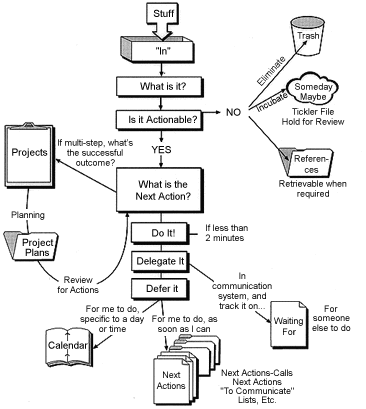
One of the talks at barcamp was on Getting Things Done, and they used a variation of the above flowchart to demonstrate a workflow for personal items. I haven't read the book yet (although it is on my toread list...), but the flow used in GTD above made me think about my own personal paradigm for dealing with todo's.
So, work first. Currently we use
Jira, just cos it rocks, and that takes care of assigning tasks among our team, recording requirements, work done, progress comments etc. However I find that the best way for me personally to deal with tasks is to make a pipeline of tasks in my immediate horizon (which is a subset of my currently assigned tasks), and record them in a low-tech format, currently a plain-text document called todo.txt which I leave open in textpad (textpad is never closed in my session ;-p ), ordered by descending priority.
Then under each item I add a breakdown of the step-by-step tasks (down to an hour or two each) that I'll need to do to complete that task. As I complete sub-items I delete them from the task (for greater satisfaction they can be moved to a separate list at the bottom of the page of down things, that way you can look back over what you've done, feels good.). This gives a really
fast way to track immediate tasks as well as a handy scratch pad for dumping text. you don't get a lot of semantic tools, but if you're like me there's some mornings where you come in and you're like "what the hell am I supposed to be doing?". keeping todo.txt helps me answer that question and push my context back onto the stack.
For my personal life, the usual answer is that I don't keep todo lists (although I know I should...). When I do though (usually when there's lots to get done and time-constraints requiring juggling), I just use the old pen & paper. I write three headings, short term (today or this week), medium term (next few weeks or months) and long term (one year to lifetime). Then I just brain-dump all the things I currently want to do under these headings. Sometimes I need to break it out a bit if there's a goal I want to achieve that doesn't fit into one of those timelines.
The short term goals are the most satisfying. when you can get home at the end of a day and tick off all the items on your list, that's sex on wheels man. Medium term goals help focus the short-term goals and provide fodder for further short-term goals. Long term goals are more strategic and tend to reflect values, eg - getting married, having kids, becoming financially independent. I really should make them less fuzzy and more measurable though...
Measurable outcomes is key. This is easy with short-term goals, but with medium- and long-term goals it gets harder. You need to keep the pressure on by referring back to the goals periodically otherwise you can't measure your performance (or lack thereof) against them, and likely you're just spinning your wheels as time goes by. It's a good idea to make these goals highly visible and stick them on your wall/mirror/door etc. when I was at uni I had my unit-per-year plan in the front of my folder and avidly crossed out the units as I completed them. Big feeling of satisfaction!
A few comments on how all this relates to GTD. I think the work flow above is very similar to the process of information-sifting that any decent geek does almost without thinking, that is, to cast the net as broad as possible and then filter it for "interesting" items to either action now, later, or to pass on to another. It's good to think about all the things you could/should do, but then you have to prune to the things that you
realistically can do, and then prioritise actually doing them. This helps triage between things that you vaguely think would be a good idea, and the things that you actually should do.
And if you keep on
getting things done, then you're guaranteed to be better off than if you hadn't done anything at all, and ideally this should build momentum in your personal life for getting the things that you want.
Lastly, don't forget to add "do nothing" to your immediate todo list every now and then... :-)


